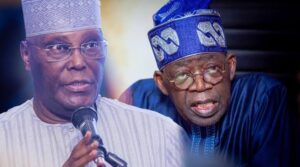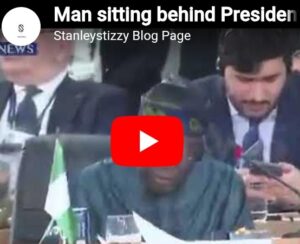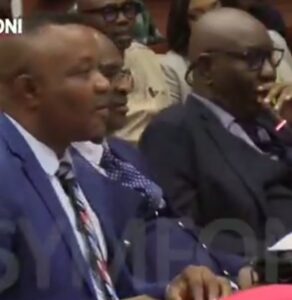2027 Countdown: PDP in Crisis, Can the Opposition Survive the APC Storm?
2027 Countdown: PDP in Crisis, Can the Opposition Survive the APC Storm?
By Ismail Omipidan, Abuja (Rewritten)

Atiku and Tinubu
The shifting tides within Nigeria’s political environment, particularly the internal turmoil plaguing the Peoples Democratic Party (PDP), have fueled speculation about a potential realignment ahead of the 2027 general elections. Among the most talked-about developments is the rumored departure of former Vice President Atiku Abubakar from the PDP, possibly in favor of the Social Democratic Party (SDP), as part of a broader coalition to challenge the ruling All Progressives Congress (APC).
Although Atiku’s team has denied any plans to exit the PDP, political watchers remain skeptical. The recent defection of his 2023 running mate and former Delta State Governor, Senator Ifeanyi Okowa, to the APC has only intensified such speculation. Okowa reportedly claimed that Atiku’s departure from the PDP was imminent, though this has been publicly refuted by Atiku’s spokesperson, Paul Ibe.
“We’ve addressed this matter previously. Atiku Abubakar remains committed to the PDP and has never indicated an intention to leave,” Ibe clarified. “Those spreading rumors about a defection are merely speculating without basis.”
Still, many political insiders note that defections in Nigeria often occur without prior warning. A recent example is Delta State Governor Sheriff Oborevwori, who denied plans to switch parties—only to officially join the APC weeks later.
According to party insiders, Atiku’s future within the PDP could hinge on his prospects of securing the party’s presidential nomination. Should those prospects fade, a departure might become more likely. Sources say that before the wave of recent defections, opposition groups had mapped out a potential alliance where Atiku would emerge as a joint presidential candidate, with other key figures like Peter Obi and Nasir El-Rufai playing significant roles. However, that blueprint now appears to be in jeopardy.
One former governor revealed that the initial strategy involved a three-party agreement similar to the 1999 AD/APP coalition. However, tensions within the SDP and reluctance to share platforms with Atiku or El-Rufai have raised doubts about its viability.
Amid these political maneuvers, Northern Nigeria is reasserting its influence. The Arewa Consultative Forum (ACF) recently reminded the country of the region’s demographic strength and political clout. Led by its Board of Trustees Chairman, Alhaji Bashir Dalhatu, the ACF emphasized that with 19 states, significant legislative representation, and a sizable portion of the population, the North remains a formidable force in determining electoral outcomes.
Dr. Usman Bugaje, a respected Northern intellectual, echoed similar sentiments. While criticizing the Tinubu administration’s early performance, Bugaje dismissed the rotational presidency as a distraction and advocated for leadership based on merit rather than regional zoning.
Bugaje’s views extend to the emerging coalition against Tinubu. He believes many of the actors lack the credibility and competence to offer real alternatives. Instead, he calls for an elite-driven consensus to define leadership standards and drive meaningful reforms akin to global models like China and Singapore.
Internally, the PDP is struggling. Once dominant in the North, the party now controls only three of the 19 Northern states. The APC, bolstered by high-profile defections and a weakened opposition, currently holds sway in 15. The PDP’s ongoing leadership crisis, particularly the unresolved issue of its national secretary, continues to discourage potential candidates and supporters.
According to political sources, unless the PDP urgently restructures, it risks losing its relevance before 2027. The rising wave of defections is driven less by loyalty to Tinubu and more by political survival amid legal uncertainties and organizational disarray within the PDP.
Meanwhile, President Tinubu is said to be concerned about his popularity in the North-West, particularly in Kano. Though speculation is rife about reshuffling his ticket—possibly replacing Vice President Kashim Shettima with former Kano Governor Rabiu Musa Kwankwaso—analysts caution that such a move could ignite further factionalism within the region, especially if it undermines current APC National Chairman Abdullahi Ganduje.
Despite growing discontent, Tinubu remains well-positioned within the APC. Even if the opposition unites, overcoming APC’s entrenched dominance will require an extraordinary realignment across Nigeria’s political blocs. Until then, the ruling party remains on track for a potential fourth consecutive electoral victory.
TRENDING SONGS
 Viral video: SS1 Student Sparks Outrage After Allegedly Acquiring Mercedes-Benz — Father Demands Return, Friends Disagree
Viral video: SS1 Student Sparks Outrage After Allegedly Acquiring Mercedes-Benz — Father Demands Return, Friends Disagree
 Family Curse: No Woman In My Family Can Keep Husband Alive Past Their 35th Birthday, Lady Reveals
Family Curse: No Woman In My Family Can Keep Husband Alive Past Their 35th Birthday, Lady Reveals
 Video: Man Sitting Behind Tinubu During His Speech At BRICS Meeting Trends Online
Video: Man Sitting Behind Tinubu During His Speech At BRICS Meeting Trends Online
 Oga Sabinus-Sabinus is Completed Finished(Comedy Video) Download
Oga Sabinus-Sabinus is Completed Finished(Comedy Video) Download
 Funny Video: Senate vs a Proud Professor
Funny Video: Senate vs a Proud Professor
 JUST IN: See the Numbers of People Road Accident Killed in Lagos
JUST IN: See the Numbers of People Road Accident Killed in Lagos
Share this post with your friends on ![]()













